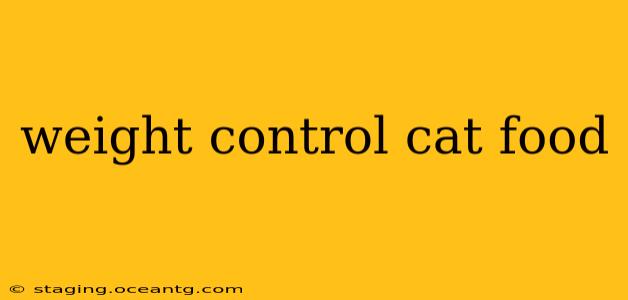Is your feline friend carrying a little extra fluff? Many cat owners face the challenge of managing their cat's weight. Obesity in cats is a serious issue, linked to various health problems like diabetes, arthritis, and heart disease. Choosing the right weight control cat food is a crucial step in helping your cat achieve and maintain a healthy weight. This guide will explore the key aspects of weight management for cats, including choosing the right food, understanding nutritional needs, and implementing a holistic approach to weight control.
What Makes Cat Food Suitable for Weight Control?
Weight control cat food is specifically formulated to help cats lose or maintain a healthy weight. Key characteristics include:
- Reduced Calories: These foods contain fewer calories per serving compared to regular cat food. This calorie deficit is essential for weight loss.
- Increased Fiber: Fiber helps cats feel fuller for longer, reducing overall food intake. It also aids in digestion.
- Higher Protein Content: Protein is crucial for maintaining muscle mass during weight loss. Weight control diets often prioritize high-quality protein sources.
- Controlled Fat Levels: Fat is energy-dense, so weight control foods often have reduced fat content. However, it's important to ensure the fat levels aren't too low, as fats are essential for certain bodily functions.
- Balanced Nutrients: Despite the calorie reduction, these foods are designed to provide a balanced range of essential vitamins and minerals to support overall health.
How Many Calories Should My Cat Eat?
Determining the appropriate calorie intake for your cat depends on several factors, including their age, breed, activity level, and current weight. It's crucial to consult your veterinarian. They can assess your cat's individual needs and recommend a suitable daily calorie intake. They can also help you determine your cat's ideal weight and create a tailored weight loss plan.
What Are the Best Ingredients to Look For in Weight Control Cat Food?
Look for weight control cat food with high-quality protein sources, like chicken, turkey, or fish. Ingredients like whole grains and vegetables can add fiber and essential nutrients. Avoid foods with excessive fillers or artificial ingredients. Always check the ingredient list and choose foods with easily recognizable and high-quality ingredients.
Are There Different Types of Weight Control Cat Food?
Yes, several types of weight control cat food cater to different needs:
- Prescription Diets: These are only available through veterinarians and are often used for cats with significant weight problems or underlying health conditions. They are formulated to address specific health concerns alongside weight management.
- Over-the-Counter Weight Control Foods: These are widely available at pet stores and online retailers. They are generally suitable for cats with moderate weight issues.
What Other Factors Contribute to Weight Management in Cats?
Successfully managing your cat's weight requires a holistic approach:
- Portion Control: Accurately measuring your cat's food is essential. Following your vet's recommended calorie intake is critical.
- Regular Exercise: Encourage play and physical activity to burn calories. Interactive toys and playtime can help cats stay active.
- Monitoring Water Intake: Ensuring adequate water intake is crucial for overall health and can contribute to feelings of fullness.
- Veterinary Check-ups: Regular check-ups allow your veterinarian to monitor your cat's progress and make adjustments to their weight loss plan as needed.
Can I Use Human Food to Help My Cat Lose Weight?
No, it's generally not recommended to feed your cat human food for weight loss. Human foods often lack the essential nutrients cats need and can be harmful. Stick to cat food formulated for weight control, as it is balanced to support their nutritional needs.
My Cat is Overweight; What Should I Do?
If you suspect your cat is overweight, consult your veterinarian immediately. They can conduct a thorough examination, determine the cause of the weight gain, and create a personalized weight loss plan. Early intervention is crucial in preventing long-term health problems associated with feline obesity.
This comprehensive guide provides valuable information about choosing the right weight control cat food and implementing a holistic approach to weight management. Remember, consulting your veterinarian is crucial for personalized advice and guidance in achieving and maintaining your cat's ideal weight. A healthy weight contributes to a longer, happier, and healthier life for your feline companion.
